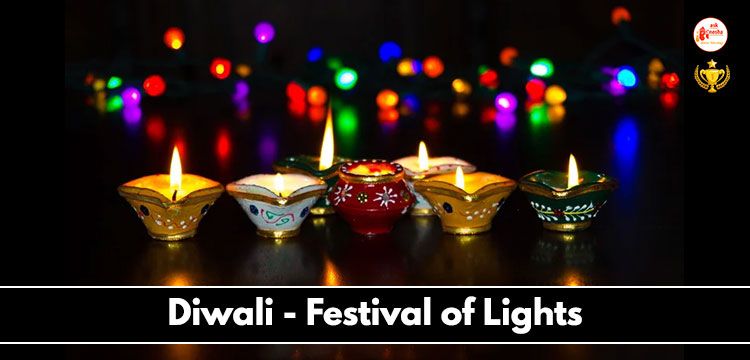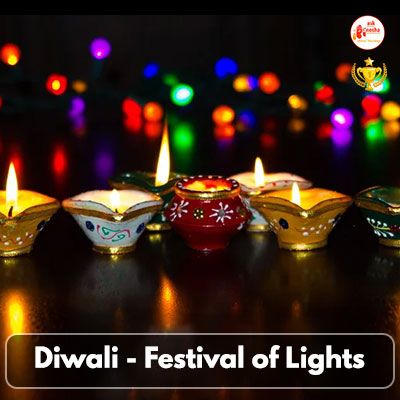Diwali is the biggest and brightest festival, celebrated with great enthusiasm and happiness in India. Its literal meaning comes as deep= light andavali= a row i.e., a row of lights. However, there are various other stories associated with the festival. Some people believe it to be the celebration of the marriage of Goddess Laxmi and Lord Vishnu. In Bengal, the festival is dedicated to the worship ofMother Kali, the dark goddess of strength.Lord Ganesha, the elephant-headed God, thesymbol of auspiciousness and wisdom. He is also worshiped in most Hindu homes on this day. InJainism, Deepawali has an added significance to the great event of Lord Mahavira attaining the eternal bliss ofnirvana.
History:
Diwali also commemorates the return ofLord Rama. Along with Sita and Lakshman from his fourteen-year-long exile and vanquishing the demon-king Ravana. In joyous celebration of the return of their king, the people of Ayodhya, the Capital of Rama, illuminated the kingdom with earthendiyas(oil lamps) and burst crackers. Diwali is a five-day festival in many regions of India. With Diwali night centering on the new moon the darkest night at the end of the Hindu lunar month ofAshvinand the start of the month ofKartika. In the Common Era calendar, Diwali typically falls towards the end of October, or first half of November each year. The darkest night of autumn lit with diyas, candles, and lanterns. It makes the festival of lights particularly memorable.Diwali is also a festival of sounds and sights with fireworks andrangolidesigns. The festival is a major celebration of flavors with feasts and numerous mithai (sweets, desserts) as well as a festival of emotions. This festival ritually brings family and friends together every year.
Rituals:
Rituals and preparations for Diwali begin days or weeks in advance. People wear new clothes or their best outfits as the evening approaches. Thendiyasare lit, pujas are offered toLakshmi, and to one or more additional deities depending on the region of India. TypicallyGanesha,Saraswati, andKubera.Lakshmi symbolizes wealth and prosperity, and her blessings are invoked for a good year ahead. She is believed to roam the earth on Diwali night. On the evening of Diwali, people open their doors and windows to welcome Lakshmi. And placediyalights on their windowsills and balcony ledges to invite her in. On this day, the mothers who work hard all year are recognized by the family. And she is seen to embody a part of Lakshmi, the good fortune, and prosperity of the household. Small earthenware lamps filled with oil are lighted and placed in rows by some Hindus along the parapets of temples and houses. Some setdiyasadrift on rivers and streams. Important relationships and friendships are also recognized during the day, by visiting relatives and friends, exchanging gifts andsweets.
Celebrations:
After the puja, people go outside and celebrate by lighting uppatakhe(fireworks). Children enjoysparklersand a variety of small fireworks. While adults enjoy playing with ground chakra, Vishnu chakra, flowerpots (anaar),sutli bomb, rockets and bigger fireworks. The fireworks signify the celebration of Diwali as well a way to chase away evil spirits.After fireworks, people head back to a family feast, conversations andmithai(sweets, desserts).
Sloka to attain financial prosperity:
"Om Shreem Maha Lakshmi Devi Swaha" Chanting of this mantra can be done either to tide over financial troubles or to attain new levels of prosperity. Even the other ten regal qualities of Goddess Lakshmi may also accrue in us, from the practice of this month.
Diwali - As A Harvest Festival
Diwali is also celebrated as a harvest festival in India. It takes place when the cropping season ends. Instead, other than this fact, there are many more customs that would tell us that it is a harvest festival. In earlier times also, the reaping of harvest brought happiness and prosperity in the lives of farmers. Hence, even now the farmers celebrate the harvesting time with joy. And they also offer prayers to God for yielding good harvest during Diwali or Deepavali. In old days, farmers used to worship Goddess Lakshmi, the Goddess of wealth. On Diwali, farmers perform an Aarti and prepare dishes made of rice taken from the harvest. This custom is followed all over in India in rural and urban areas. October-November is the time when Kharif harvesting season ends. And this is also one of the reasons for considering Diwali as a harvest festival.
Festival of peace
On this festive occasion, Hindu, Jain, and Sikh communities also mark charitable causes, kindness, and for peace. For example, at the international border, every year on Diwali, Indian forces approach Pakistani forces and offer traditional Indian sweets on the occasion of Diwali. The Pakistani soldiers anticipating the gesture, return the goodwill with an assortment of Pakistani sweets.
In other parts of the world:
Diwali is celebrated around the world, particularly in countries with significant populations of Hindu, Jain and Sikh origin. These includeSri Lanka,Pakistan,Myanmar,Thailand, Malaysia,Singapore,Indonesia,Australia,New Zealand,Fiji,Mauritius,Kenya,Tanzania. Along with South Africa,Guyana,Suriname,Trinidad and Tobago, theNetherlands,Canada, the United Kingdom,United Arab Emirates, and theUnited States. With more understanding of Indian culture and global migration of people of Indian origin. The number of countries where this festival is celebrated has been gradually increasing. While in some countries it is celebrated mainly by Indian expatriates, in others it is becoming part of the general local culture. Celebrate diwali And perform sampoorna Diwali puja on the auspicious occasion of thefestival for you and your family.















 Translate
Translate